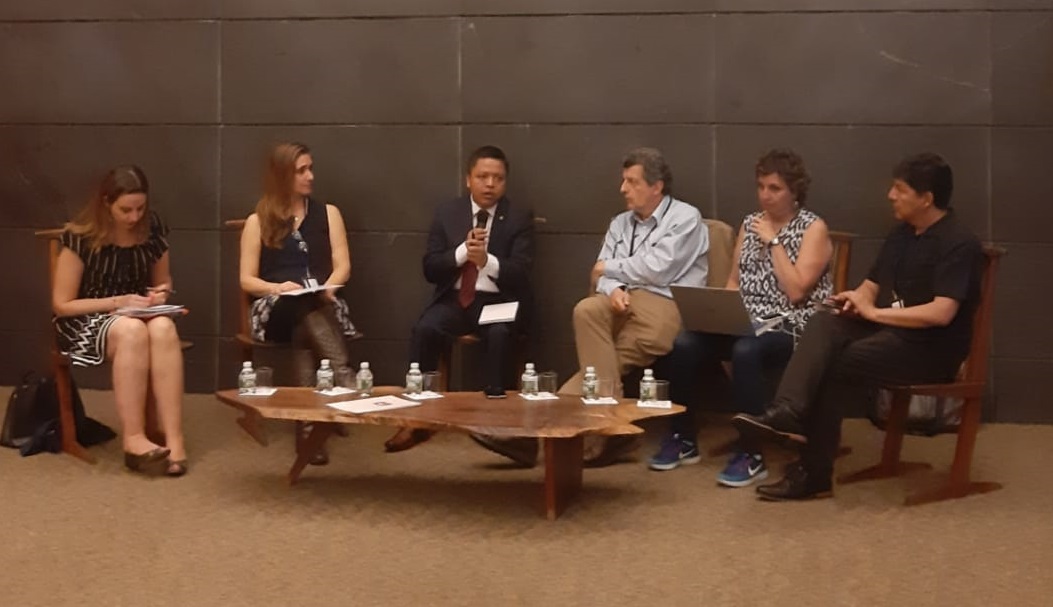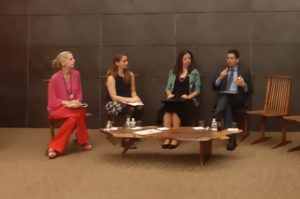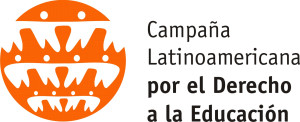Side event during the UN Forum: “We must educate for citizenship and democracy”
July 11, 2019
During the event organized by CLADE, the challenges of education in Latin America and the Caribbean were addressed, in a context of setbacks for human rights and multilateralism, as well as of fragility of democracies.
“One of the main challenges is to guarantee educational quality and, for that, reflect on what kind of quality we want, towards the guarantee of an education that trains people for global citizenship and the strengthening of democracy.” This was one of the reflections that were shared during the high-level discussion “Human rights at risk: impacts for education in Latin America and the Caribbean.” The meeting was held yesterday (July 10) in New York, in the context of the UN High-Level Political Forum, and as an initiative of the Latin American Campaign for the Right to Education (CLADE).
The participants in the opening table of the event were: Héctor Alejandro Canto Mejía, Deputy Minister of Education of Guatemala; Naiara Costa, from the Division of the SDGs (Sustainable Development Goals), Department of Economic and Social Affairs of the United Nations (UN / DESA); Roberto Bissio, from Social Watch; and Camilla Croso, general coordinator of CLADE.

During the discussion, the challenges of education in the region were addressed, in a context of setbacks for human rights and multilateralism, as well as of fragility of democracies. Cultural diversity; school coverage in primary and secondary school; teacher training; migration; respect for diversity and gender equality in education; educational financing; the increased privatization, while public systems are stigmatized; and the challenge of guaranteeing a quality lifelong education for all, were topics highlighted in the presentations.
“All human rights are at risk when we do not comply with the human right to education,” said Camilla Croso at the opening of the conversation.
Next, the Deputy Minister of Education of Guatemala, pointed out some challenges for the realization of the human right to education in his country. “The main challenges are guaranteeing coverage and, in parallel, advancing the rate of completion, transition from primary to secondary school, quality and equity in the education system,” he said.
He added as another challenge the guarantee of quality lifelong education for all. “An education that provides training for global citizenship and democracy.”
Roberto Bissio emphasized the importance of ensuring human rights and protecting the people who defend these rights beyond the achievement of the Sustainable Development Goals. “The central question is to what extent the SDGs legitimize the struggle for rights. We can not forget that in Latin America and the Caribbean human rights defenders are at constant risk,” he said.
Naiara Costa addressed the role of the United Nations and multilateralism for the realization of human rights and the promotion of sustainable development. “To achieve the SDGs, it is essential to connect the global level with the local, national and regional levels”, he said.

Debate
Representatives from the following organizations: Argentine Campaign for the Right to Education; Bolivian Campaign for the Right to Education; Campanha Nacional pelo Direito à Educação – Brazil; Forum for the Right to Public Education in Chile; Salvadoran Network for the Right to Education; Collective of Education for All of Guatemala; Forum Honduras Honduras; Peruvian Campaign for the Right to Education (CPDE); Socio-educational Forum (Foro Socioeducativo), of the Dominican Republic; Popular Education Network among Women of Latin America and the Caribbean (REPEM); ILGALAC (International Lesbian, Gay, Bisexual, Trans and Intersex Association for Latin America and the Caribbean); Global Campaign for Education; ActionAid International; and EDUCO, among other organizations and networks, participated in the debate.
Vernor Muñoz, from Global Campaign for Education, recalled, as an obstacle to education and other human rights, the criminalization of social protest, especially of students and teachers in different countries of Latin America and the Caribbean, which also operates in the symbolic field and in the media.
Roberto Baeza, from ILGALAC, spoke about comprehensive sexual education and school violence against LGBTI people. “Gaps in inequality in education and other sectors are widened with the advance of fundamentalisms. The trans population does not have access to their right to education, they are who most leave the school because of experiences of discrimination,” he said.
Marcela Browne, from the Argentine Campaign for the Right to Education, said that in the debate on the fulfillment of the right to education, it is necessary to ask: “What are the risks of external debt and tax fraud for educational justice in the region?
New document
During the event, CLADE launched the publication “Civil Society Advocacy for the Human Right to Education: Stories and Lessons Learned from Latin America and the Caribbean – Volume 3”.
Read more and download the document here
CLADE at the UN High-Level Political Forum
Almost four years after the adoption of Sustainable Development Goal 4 (SDG 4), about education, the United Nations High-Level Political Forum (HLPF) 2019, official platform for monitoring the Sustainable Development Goals (ODS) internationally, took place from 9 to 18 July in New York.
In this edition, the HLPF focuses on the revision of SDG 4, as well as goals 8 (decent work and economic growth), 10 (reduction of inequalities), 13 (climate action), 16 (peace, justice and solid institutions) and 17 (partnerships to achieve the objectives).
CLADE participated in the HLPF and its side events with a delegation of 14 people from 9 countries: Argentina, Bolivia, Brazil, Chile, El Salvador, Guatemala, Honduras, Peru and the Dominican Republic.
CLADE members in the countries that were reviewed by the UN this year (Guatemala and Chile) prepared reports with contributions on the status of SDG 4 at national level. In addition, CLADE members from Brazil and El Salvador prepared reports, highlighting the challenges of education in their territories, since these countries had indicated that they would participate in the review process carried out by the UN, but finally this did not happened.





